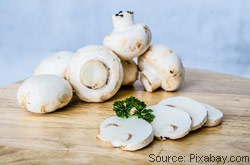
If you live alone, you may dread the responsibility of
cooking. However, preparing your own meals saves money, promotes healthy habits
and can be both easy and fun! If you have no current culinary skills, teaching
yourself to cook can be intimidating, but with the help of cookbooks and simple
tutorials, anyone can learn the basics.
Read on for helpful tips for
cooking solo to make your meal preparations a breeze.
Benefits of cooking for one
Do you feel as if cooking for just
one person is a waste of time? That couldn't be further from the truth. There
are many reasons why cooking your own meals is beneficial and worthwhile.
- It's healthy. If you live alone, cooking for just yourself can seem
like an unnecessary chore. The convenience of fast food, take out, and dining in
restaurants can be alluring, but preparing your own meals in your kitchen is
much healthier. No matter how healthy you think your choice in a dining
establishment is, it's always higher in calories than the same dish prepared at
home. Restaurants often use preparation shortcuts or additives that diminish the
food's nutritional value and add empty calories.
- It's cheaper. Dining out is expensive. The convenience may sway you
into spending extra money-and consuming extra calories-but eating out every
night (even in low-cost establishments) can cost you two or three times more
than a week's worth of groceries.
- You can easily accommodate your dietary needs. Are you a vegetarian?
Gluten-intolerant? Eat only organic? No matter what dietary restrictions you
have, cooking for yourself makes it much easier to ensure your meals contain the
proper ingredients and nutrition for your lifestyle.
- It's empowering. Being self-sufficient and independent begins with
the ability to take care of yourself. Preparing your own meals frees you from
depending on others for the simplest, most basic human
need-sustenance.
Tips for cooking for one
If you don't have much cooking
experience, a recipe book can be your best friend. However, be sure to keep the
following tips in mind to keep your meal preparations efficient and
cost-effective.
- Plan your weekly meals. Having a meal plan in advance can help you
shop smart and make the most out of your produce, meat and other ingredients for
the week. If you're buying greens, they can be used in a salad for lunch one
day, sautéed as a side for dinner another night, and then used again in a
breakfast frittata.
- Cook more, have left overs. Many recipes suggest measurements needed
to cook for two to four people. While you may think you need to use your math
skills to properly prepare the meal for just yourself, it can be efficient to
make extra to eliminate the need for cooking the following night. You can also
use left overs for a convenient lunch the next day, or revamp the recipe if you
dislike eating the same dinner two nights in a row. For example, your grilled
chicken and veggie dinner can become a delicious sandwich the next night with a
whole wheat wrap.
- Cook your main protein for the week. Roasting a chicken or turkey
breast on Sunday night can make meal-making the rest of the week easy. Use the
meat in salads, on sandwiches, with pasta or rice, or just enjoy with a side of
veggies. You can also use this tactic with a half a pound of fresh fish
purchased at the market, but be sure to consume it or freeze it within a few
days.
- Make cooking fun. Cooking may seem like a chore because it is boring
or a lot of work. In reality, many recipes are very simple to prepare, and you
can certainly make the experience more enjoyable. Listen to music or enjoy a
glass of wine as you dice veggies, measure ingredients and sauté away.
Constantly finding new recipes to try can also be fun and keep the task from
growing mundane. Don't be afraid to get creative and try adding your own spin on
things!
 Avoid recipes with rare ingredients. While exotic
recipes that call for a variety of uncommon or expensive ingredients may be
intriguing, you don't want to waste money buying a bag of fresh shallots that
you won't use again until they have wilted. You can always alter recipes to
avoid certain ingredients, such as using only one fresh herb in a recipe that
calls for three different ones. Make it a point to find some other recipes that
use the same herb to try later in the week.
Avoid recipes with rare ingredients. While exotic
recipes that call for a variety of uncommon or expensive ingredients may be
intriguing, you don't want to waste money buying a bag of fresh shallots that
you won't use again until they have wilted. You can always alter recipes to
avoid certain ingredients, such as using only one fresh herb in a recipe that
calls for three different ones. Make it a point to find some other recipes that
use the same herb to try later in the week.
- Stock up on essentials. What are the foods that you will use the
most? Stock up when your staple items are on sale, especially non-perishables
like canned soup, frozen foods and dry herbs and spices. Avoid buying foods with
a short shelf-life in bulk-even if you love avocadoes, once they ripen, they
have about a three-day window for consumption.